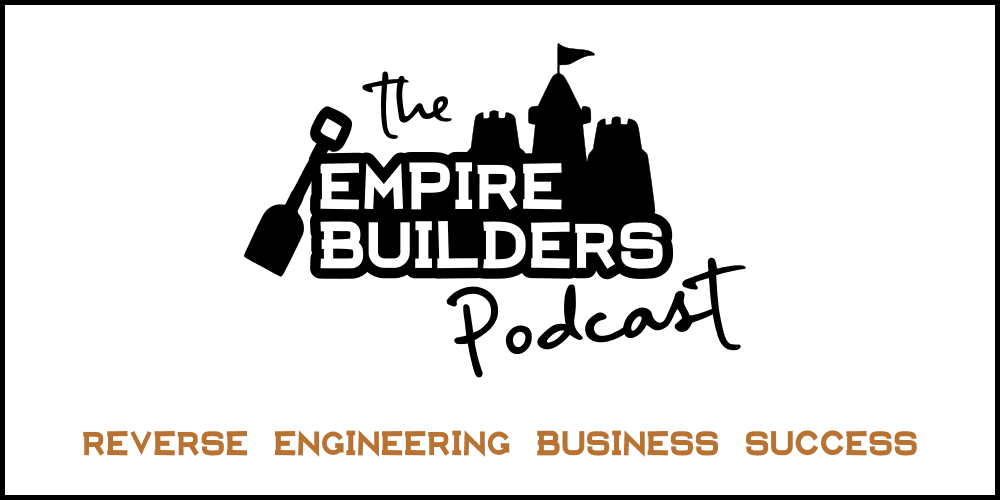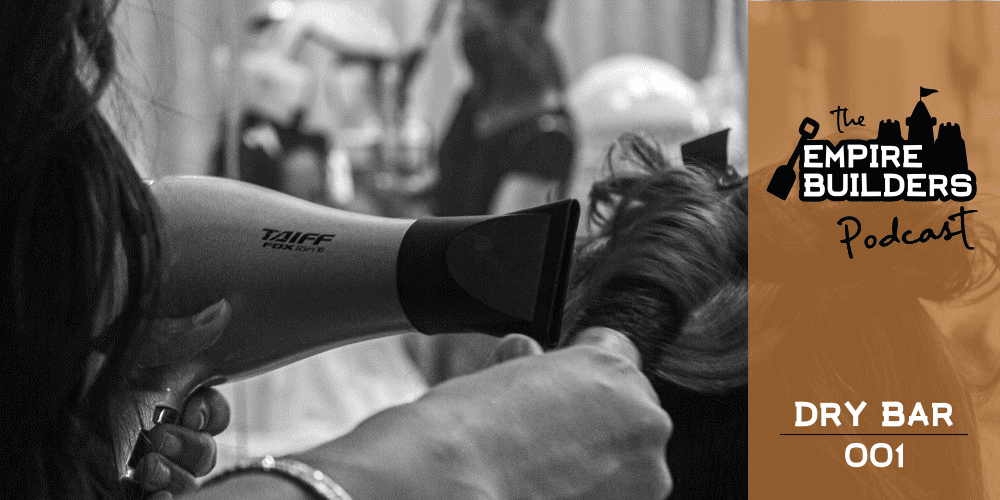The staff, the critics, and retailers all said it would fail. It lacked all the things people wanted but gave them one thing they had not thought about. And a star is born.
David Young:
Welcome to the Empire Builders podcast, teaching business owners the not-so-secret techniques that took famous businesses from mom and pop to major brands. Stephen Semple is a marketing consultant, story collector, and storyteller. I’m Stephen’s sidekick and business partner, Dave Young. Before we get into today’s episode, a word from our sponsor, which is… Well it’s us, but we’re highlighting ads we’ve written and produced for our clients. So here’s one of those.
[Tapper Jewelry Ad]
David Young:
Stephen, we’re doing a flashback today, right? We’re going back to when, the seventies?
Yeah. And we’re also doing a little bit of a departure because we’re actually going to talk about a company at the stage that it was very… Still, it was already large. It was already successful, but I still think there is a lesson to be learned. And what we’re going to talk about is the birth of Sony Walkman.
David Young:
The birth of a Sony Walkman. It was a thing before Guardians of the Galaxy for you kids that are listening.
Stephen Semple :
It actually played this little thing called a cassette.
David Young:
We can go into all kinds of minutia and trivia about cassettes and their interaction with pencils or big pens.
Stephen Semple :
I’ll be wearing my shirt that has all the records and cassettes on it. I dress inappropriately, I apologize to everyone.
David Young:
And maybe we should offer a mixed tape prize.
Stephen Semple :
There we go. So anyway, going back to the birth of the Sony Walkman, it all started with the Sony chairman. And I’m going to butcher the name, so I apologize. Masaru Ibuka. And when he traveled he loved listening to music. Now Sony had this product… It was actually called the Pressman. It was for recorders. So it had a recorder and a microphone, but it also had the ability to play things back. So Sony had this product. And when he traveled, he took it with him and he would listen to music on planes and things along that line.
Stephen Semple :
And he found it was just too heavy. He said, “This thing is just way too heavy.” And so he went back to his designers and he said, “Look, let’s modify the Pressman. Let’s get the weight down. Let’s remove the recording feature. Let’s remove the speakers. Don’t put a radio in it, but basically let’s strip this thing down that basically all it does is play a cassette through headphones. That’s what this will do, nothing more. No speakers, no record, no radio, no bells, no whistles, no nothing.”
David Young:
It doesn’t even have to be much bigger than a cassette itself.
Stephen Semple :
Right. Yeah. And if you go back to the early Walkmans, they were not… It was funny, when CDs came out and went to the Discman, the Discman was actually bigger than the Walkman-
David Young:
But it had to fit a CD in it.
Stephen Semple :
Yeah. It was about that thick, but not much bigger than the size of a cassette and very reasonably priced and highly durable and all those other things. But here’s where it gets interesting. His designer said, “No one’s going to be interested in this. This is a stupid idea. No radio, who’s going to want it? No speaker, no record. No. People carry around… They carry the boombox on their shoulder. And that’s what they want because there’s a group of people wanting to listen to the music, and we want to be able to record stuff and all that.”
Stephen Semple :
And so he faced this tremendous pushback, but he said, “Look, we’re doing it.” And then he took it out to retailers and retailers are like, “No one would be interested in this. No one’s going to want this. This is a dumb idea because it’s got no speaker, no record, no radio. That’s not how people consume this.” And then the first year, boom, 400 million units out the door.
David Young:
That’s not bad.
Stephen Semple :
Not bad for a product that no one would be interested in.
David Young:
Yeah. That’s not nobody.
Stephen Semple :
That’s not nobody. But here’s, to me, the interesting thing about all of this.
David Young:
Stay tuned. We’re going to wrap up this story and tell you how to apply this lesson to your business right after this.
[EMPIRE BUILDERS AD]
Brought to you by the least full of shit marketers association of America. Yes, that’s a low bar, but we clear it mightily. We’re also the largest pay-per-performance branding group in North America, and that part’s for reals. If you’re looking for advertising advice geared towards local owner-operated companies, this is your podcast. And now you can pick the brains of these advertising geniuses over lunch without having to pay for lunch or even leave your office. We’re talking 90 minutes of straight answers to all your burning questions about lead generation, customer acquisition, mass media branding. How to get off the paper crack treadmill, anything you want. And the only coin required is candor because we can’t give no bullshit advice without basing it off no BS data on your company, competitive landscape, operations and all that jazz.
We send you a presume questionnaire. You fill it out candidly and boom, Bob’s your uncle. You’re in like Flynn. And we’ll be Frank as fuck in giving you the straight scoop on all the advertising and business growth questions you always wanted to know but were too afraid to ask. You’ll also get our no pitching and no bitching guaranteed. No pitching means we won’t pitch you or try to sell you in any way. If you want more after 90 minutes, you’ll have to ask. And no bitching means if you don’t think the meeting was worth your 90 minutes, we’ll send you 100 bucks. Consider it us picking up the tab for lunch and putting our money where our mouth is. Sound like a not so full of shit offer? Well, that is what we’re known for. Take us up on it at theempirebuilderspodcast.com.
David Young:
Let’s pick up our story where we left off and trust me, you haven’t missed a thing.
Stephen Semple :
Here’s, to me, the interesting thing about all of this, he knew a lot of times when there’s this great innovation that comes from businesses where the owner or the chairman have to push against people, part of the reason why they know it works is because they see the need in themselves. He looked out and said, “Look, there’s other people who travel and other people who want to walk around listening to music. Not everybody wants to have that thing over their shoulder. This would be a really cool idea.” So he was a focus group of one, but you could also look around and go, “You know what? I can imagine other people having the same displeasure of this experience that I am having right now. So therefore there’s a product need.” And the fact that everybody said, “Oh, no. People aren’t going to be interested in that.” He pushed back on because the focus group didn’t like it.
Stephen Semple :
Who cares about the focus groups before? Or it’s not been done before, this or the other thing. It is amazing how many times new businesses, new ideas, new products, new services are almost always met with this not a good idea wall. Starbucks, crazy, [Drybar 00:07:25] , nuts. If you want to go back and take a look at some… Wrigley advertising when the world is going to hell in a handbasket or advertising during the war when they can’t sell their product, nuts, crazy, nuts. Almost all of them have an element of that. And look, Sony created the industry of portable music through the Walkman.
David Young:
Absolutely. It makes you wonder, doesn’t it? Because this happened when Steve Jobs was a very, very young guy, right?
Stephen Semple :
Yeah.
David Young:
This was before Apple. It makes me wonder how much influence something like this decision to produce the Walkman, how much influence that had over Jobs and his notion of we’re not going to ask customers what they want because they don’t know. They’re not inventing the future, we are.
Stephen Semple :
And it’s really interesting. Even if you go back to like the very, very first iPod commercial… And if you think about it, at that time everybody was calling things MP3s, and it was all about size and performance and everything else. And Apple’s message was really simple, a thousand songs in your pocket.
David Young:
In your pocket. Because hard drives came out that were about the size of a cassette deck.
Stephen Semple :
Because what could you say the consumer would love to have? “I’d love to have a thousand songs in my pocket.” Because the limitation of the Walkman was I can only take a couple of cassettes with me, right?.
David Young:
Yeah. And then the CD version of it. Using it you had to carry a bunch of CDs around with you. So it was really about putting more songs in your pocket.
Stephen Semple :
More songs in your pocket. But it all started with Sony sitting there saying, “We need to do this. And the way to do this is less is actually more. How many times is the record feature done? Do we really need speakers? Do we really need this, this, this and this? No. Let’s strip all those things down. Get it its essence. Less is sometimes more.” Walk around being a consumer. If there’s something that is inconvenient to yourself, if there’s something that you don’t like and you experience some of, that’s a business opportunity. And it may also be something that you can change inside your four walls. Be aware of those things where you go, “I wish I had…” Or, “This is inconvenient.” Or, “This could be better.” Because all those things represent actually potential business opportunities.
David Young:
Thanks for listening to the podcast. Please share us. Subscribe on your favorite podcast app and leave us a big fat juicy five-star rating and review at Apple podcasts. And if you’d like to schedule your own 90-minute empire-building session, you can do it at empirebuildingprogram.com.






